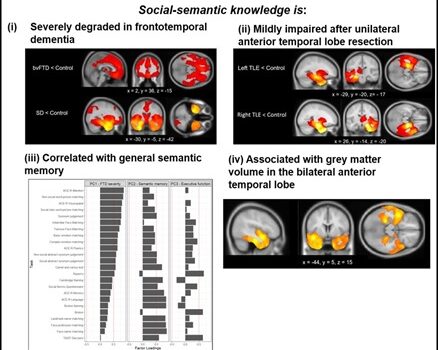A new study by Rouse and colleagues addressed several important clinical knowledge gaps in frontotemporal dementia (FTD); (1) how is social-semantic knowledge impaired in FTD? (2) how distinct is social-semantic memory from general conceptual knowledge? and (3) What is the division of labour between the left and right anterior temporal lobes for social-semantic knowledge?
The authors assembled a new neuropsychological battery spanning the many different types of social concept that had previously only been explored in isolation, and directly compared performance with non-social general semantic knowledge. A large cohort of people with FTD (including behavioural-variant FTD, semantic dementia and ‘mixed’ cases) were recruited, as well as people with left or right anterior temporal lobe resection for epilepsy. Participants had structural MRI to determine the neuroanatomical correlates of social conceptual knowledge.
Social and non-social concepts were severely degraded in FTD (both bvFTD and SD), but only mildly impaired by unilateral resection. Social- and non-social semantic performance was correlated with bilateral anterior temporal lobe grey matter volume. These findings indicate that social-semantic knowledge is part of a broader conceptual system underpinned by a bilateral semantic hub, situated in the anterior temporal lobes.
The full paper can be read here: https://doi.org/10.1093/braincomms/fcae378

 MRC Cognition and Brain Sciences Unit
MRC Cognition and Brain Sciences Unit


